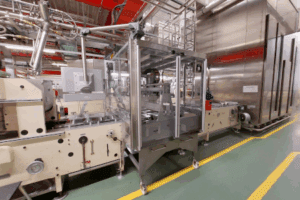Editor Caitlin Gittins talks to Kerrina Thorogood, Commercial Partnerships Director at Fairtrade Foundation, to learn more about the work Fairtrade is doing to support the cocoa sector.
Please introduce yourself and what you do?
I am Director of Partnerships at the Fairtrade Foundation and I lead a fantastic, highly skilled, and passionate team of people who forge strategic partnerships with companies, donors, NGOs, and coalitions that share our commitment to delivering positive impact for farmers and workers through sustainable, resilient, and just supply chains.
Core to our work is Fairtrade certification which ensures products are sourced against a set of ambitious social and environmental standards, producers are paid a Fairtrade minimum price, and the cooperative receives an additional premium to be spent on social and environmental good in the community.
Fairtrade is now increasingly working in strategic partnerships that are seeing us broaden our approach to deliver the solutions farmers desperately need. We work with partners on supply chain solutions and programmes; on joint advocacy to shift the whole sector or government policy, on thought leadership, and inspiring employees and consumers to play their part.
What are the main challenges you see facing cocoa farmers and how do you think we can address these challenges?
Most cocoa today is grown on small family farms with little access to electricity, clean water, reliable roads, or quality schools. Compounding these challenges are negative effects of climate change and persistent market failures. Farmers are disconnected from formal financial systems, not widely experienced in managing cooperatives and lack alternative income sources to offset market volatility. These obstacles can leave cocoa farmers in poverty, unable to invest in or grow their businesses, due to factors beyond their control.
We need to listen to the farmers. They are the ones who are seeing first-hand what is happening, and they are the ones who know best what needs to be done to improve their crops and livelihoods. Cocoa producers like Bismark Kpabitey from Ghana, tells us how harvests are reducing due to rising temperatures and unpredictable weather events. Yet the average cocoa farmer still earns on average as little as a dollar a day and is expected to pick up the costs of adapting to these changes. We need a farmer-first approach to unlock farmer entrepreneurship.
We also need the cocoa sector to come together. Despite multiple industry attempts to improve farmer livelihoods, the reality is that smallholder farmer poverty has not been eradicated. To see a systematic improvement in the livelihoods of farmers, the cocoa sector needs to work together pre-competitively, alongside governments and other cocoa landscape actors and commit to achieving living incomes and decent lives for cocoa farmers.
And we need creative campaigns, compelling messaging and moving concepts to engage the public in the reality that sits behind their chocolate bar. Many consumers will be unaware of the complex issues, particularly the concept of a living income. We need consumers actively to play their part in driving forward the solutions and choosing to buy Fairtrade is a good place to start.
Equally, do you see any opportunities facing cocoa farmers?
With these challenges comes increasing recognition that commercial and state actors need to work in partnership with farmers to achieve change. When farmers’ voices are heard in policy spaces and farmer organisations are working directly in partnership with businesses and certifications towards shared goals, there is an opportunity for cocoa farmers to lead and shape change. For instance, at COP27, we heard directly from Fairtrade farmers about the impacts of climate change. It was great to see this become a platform for smallholder farmer voices to influence within key policy spheres.
Last year you updated your Cocoa Standard. What is the significance of updating standards and what brought about this update?
Yes, the way we work in the cocoa category is constantly evolving to make as much progress as possible for cocoa farmers. To deepen our impact for farmers and strengthen sustainable supply chains around the world, Fairtrade has, with broad consultation with farmers and commercial actors, recently updated its Cocoa Standard with a reinforced focus on human rights, the fight against deforestation, traceability, and living incomes.
The update came about in response to our monitoring of the cocoa context for farmers, changes in the regulatory environment (where for instance human rights and deforestation are subject to legislation by governments in consuming and producing countries) and recognising the shared responsibility of compliance between producer organisations and commercial actors. As supply chains are required to comply with legislation for instance on deforestation, our standards aim to support farmers to develop their own capacity to do this.
The new standard requirements, broadly supported by commercial actors and farmers, position farmers as partners in the process of implementing human rights and environmental due diligence, drawing specific attention to the prevention of child labour in cocoa production.
Do you think introducing stricter legislation (such as the EU passing a law on tackling deforestation) is the best way to ensure the cocoa sector continues to thrive?
Yes, Fairtrade believes that national, regional, and global regulation, as part of a smart mix of measures, will support the cocoa sector to thrive.
The European Commission’s ground-breaking legislative proposal to combat deforestation is a welcome and much-needed step in the right direction towards crafting a greener and more sustainable future for all. This move confirms the European Union’s role as a global leader on the green agenda. But it is equally critical to remember that the world’s forests also provide for nearly four times as many livelihoods as the population of the European Union. Putting the preservation of decent livelihoods for smallholders at the centre of regulations for ending deforestation in tropical commodities is as important as protecting the forests themselves.
At the end of last year, you celebrated partnerships with a range of companies. Could you tell me about the importance of these partnerships, and how it benefits the confectionery sector? How are these partnerships supporting cocoa farmers?
We have seen several exciting cocoa commitments in recent years. Co-op converted 100% of their cocoa to Fairtrade in 2017 and have launched new products including the first own-label vegan Fairtrade chocolate bar. In 2021, Waitrose finalised their conversion to 100% Fairtrade cocoa across their entire confectionery range, and last year launched the first Whole Fruit Fairtrade Chocolate bar, made with 100% pure cacao fruit, helping to reduce food waste.
In 2021 Lidl rolled out their Way 2 Go chocolate across 400 stores and are now the biggest retailer by volume of Fairtrade cocoa in the UK. Aldi launched the Choco Changer, a new chocolate bar that commits to Fairtrade’s Living Income Reference Price for cocoa. Aldi is also a longstanding partner in a programme in Ethiopia, focusing on support to women flower workers. Asda and SPAR have also launched new chocolate bars and Greggs announced a switch to using only Fairtrade chocolate in its own products such as Milk Chocolate Cookies, Caramel Shortbread and Chocolate Brownies.
100% Fairtrade brand Tony’s Chocolonely also launched in major retailers in 2021. More recently, we celebrated a 100% conversion to Fairtrade by Guylian and Waitrose. Last summer, Tony’s and Ben & Jerry’s came together in a new transformative partnership with a mission to end modern slavery in cocoa and provide leadership in the promotion of paying Fairtrade’s Living Income Reference Price for cocoa.
Mars and Fairtrade have worked together for over 10 years, switching products to Fairtrade and to deliver against Mars’ sustainability strategy Cocoa for Generations. Maltesers was the first brand within the Mars family to switch to Fairtrade in 2011, later followed by Mars bar; collaborations which have led to millions of dollars of Fairtrade Premium reaching cocoa farmers. Last year we launched a new innovative three-way partnership with Mars and Ecookim (a group of cocoa co-operatives from Côte d’Ivoire) that sees us working together to enable 5,000 farmers to achieve a living income by 2030. Designed and delivered directly in consultation with farmers, it starts from the position that ‘no two farmers are the same’ and that ‘farmers know best’ to trial and deliver tailored interventions and approaches.
We also work with Mondelēz International, alongside their Cocoa Life sustainability programme. Under the partnership in Ghana, Cocoa Life commits to guaranteed high-volume purchases, clear terms of trade and loyalty payments, on top of the benefits of the Cocoa life programme itself. Our joint programme on climate change, income diversification and organisational strengthening has trained over 7,000 farmers on climate change and adaptation strategies, awarded grants to 9 unions to invest in income diversification activities and supported the unions to manage the grants and strengthen their cooperatives. Together we also secured co-funding from the Foreign, Commonwealth and Development Office (FCDO)’s Business Partnerships for Global Goals (BP4GG), which was awarded an A++ score, the highest score in the FCDO system only awarded to 2% of FCDO projects.
Anything else to note?
Fairtrade is also announcing the creation of a programme to support producer organisations in implementing effective child labour and forced labour prevention and remediation interventions that are now required in the Cocoa Standard. The programme builds on the success of the Fairtrade Covid-19 relief funds, in this case supporting producers by matching their own funds to invest in the system they determine best suits their situation. The programme will be launched with EU€450,000 of funding and has the potential to grow through contributions by partners and stakeholders.
Through a partnership with Fairtrade, cocoa sector actors benefit from our experience in working with smallholder farmers, our rigorous standards, our transformational programmes and the very high consumer recognition of our Mark. We can achieve a world where cocoa farmers are thriving, earning a living income and our favourite cocoa products are mutually beneficial for all.
Fairtrade Fortnight, the Fairtrade Foundation’s annual campaign, runs from 27th February – 12th March. The campaign is a great platform moment for businesses to showcase their sustainability. You can find out more by visiting fairtrade.org.uk.
To read more see our latest issue here.
Media contact
Caitlin Gittins
Editor, International Confectionery
Tel: +44 (0) 1622 823 920
Email: [email protected]








